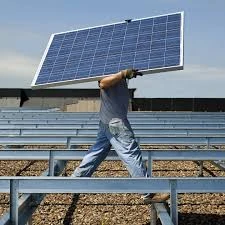solar panel inverter
The Role of Solar Panel Inverters in Sustainable Energy
As the world increasingly turns to renewable energy sources, solar power stands out as one of the most accessible and efficient options. At the heart of any solar energy system is an essential component the solar panel inverter. This device plays a critical role in converting the direct current (DC) generated by solar panels into alternating current (AC), which is the standard form of electricity used in homes and businesses.
Solar panels generate electricity during sunlight hours by converting sunlight into DC electricity through the photovoltaic effect. However, most household appliances and the electrical grid operate on AC electricity. This is where the solar inverter comes into play. By converting DC into AC, the inverter allows solar energy to be used for everyday applications, making solar systems functional and efficient.
There are different types of inverters available, each suited to various system designs and user needs. The most common types include string inverters, microinverters, and power optimizers. String inverters are typically used for residential solar systems with multiple panels connected in series (or a “string”). They are cost-effective and efficient for installations that receive uniform sunlight.
solar panel inverter

Microinverters, on the other hand, are installed on each individual panel, allowing for better performance in scenarios where panels may be shaded or face different directions. This approach maximizes energy production from each panel, leading to improved overall system efficiency. Power optimizers function similarly but work in conjunction with a string inverter, improving the output of each panel while maintaining the advantages of a centralized inverter.
Beyond mere energy conversion, modern solar inverters also incorporate smart technology that offers monitoring capabilities. Users can keep track of their solar system’s performance through mobile apps or web interfaces, allowing for timely maintenance and ensuring optimal energy production. Many inverters now feature grid-tie technology, enabling excess energy to be fed back into the electrical grid, thus providing credits to the solar system owner.
In conclusion, solar panel inverters are pivotal for harnessing solar energy effectively. By converting DC power into AC and employing advanced technologies for monitoring and optimization, inverters not only enhance the efficiency of solar power systems but also contribute significantly to a sustainable energy future. As we continue to embrace renewable energy, the importance of solar inverters will only grow, paving the way for more widespread adoption of solar technology in our daily lives.
-
String Solar Inverter: The High-Efficiency Solution for Smart Solar EnergyNewsJul.14,2025
-
Revolutionizing Rooftop Energy with the Power of the Micro Solar InverterNewsJul.14,2025
-
Power Independence with Smart Off Grid Solar Inverter SolutionsNewsJul.14,2025
-
On Grid Solar Inverter: Powering the Future with Smart Grid IntegrationNewsJul.14,2025
-
Monocrystalline Solar Panels: High-Efficiency Power for the Future of Clean EnergyNewsJul.14,2025
-
Bifacial Solar Panel: A Smarter Investment for Next-Generation Energy SystemsNewsJul.14,2025







